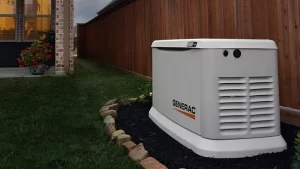Does Your Home Need an Emergency Generator in 2023?
What Is An Emergency Generator?
An emergency generator is a backup power supply that provides electricity to your home in the event of a utility outage. There are two primary types: standby generators, which have a trigger that’s automatically switched on in the event your main power supply goes out; and portable generators, which also supply emergency power but must be operated manually.
How Much Does an Emergency Generator Cost?
Similar to air conditioners, emergency generators come in different sizes and different wattages depending on the needs of your home. Prices vary quite a bit between the different sizes, as well as between portable generators and standby generators.
Standby Generators
> Up to 20,000 WATTS
Pros: Home standby generators are permanently installed (usually next to the house) and kick on automatically during an outage to provide an uninterrupted current. They can power everything in a typical home simultaneously, up to their maximum output. Standby generators can be set up to run indefinitely on natural gas or can be fueled by propane. There’s no need to connect cables, flip a switch, or start the engine.
Cons: With few exceptions, standby generators are more expensive than other types of generators. Installation costs can run into the thousands—and those costs are not included in the price range we list here. They can’t be installed in low-lying areas prone to flooding and can’t be moved in the event of a flood.
Portable Generators
> Up to 8,500 WATTS
Pros: Portable generators are the best value in terms of cost vs. capacity. Certain large models produce enough energy to meet all the power demands in a home. They can be connected to a breaker panel with a transfer switch to run hardwired equipment, such as a good pump.
Cons: Making the connection to your home’s circuit breaker panel costs as much as the generator itself. They’re noisier than large inverter generators and home standby generators. They usually run only on gasoline and use a lot of it compared with inverters. And they’re bulky; most weigh around 250 pounds. They shouldn’t be used in rain or snow without protection, such as an open-sided tent.
Considerations for choosing standby generators
Before installing an emergency generator, you’ll need a consultation. This will help the provider of your standby generator determine your specific needs. Here’s what you’ll want to clarify during your consultation:
- How many appliances you will want to run in the event of a power outage?
- Where do you want your whole house standby generator to be located?
- What type of fuel do you want to use to run your generator? You can choose natural gas, diesel, or liquefied petroleum.
Installing a standby/whole-house generator
- Installing a standby/whole-house generator requires permits and adherence to building codes. That is why you’ll need these types of generators installed by a professional.
Benefits of a standby/whole-house generator
- Standby/whole-house generators offer benefits beyond just keeping the lights on.
- When the power goes out, many crucial appliances and devices will turn off, including but not limited to refrigerators, medical hardware, and heating services. With the reliability that standby/whole-house generators offer, you can keep your family safe while knowing the pipes won’t freeze, your food will stay fresh, and you can live in relative comfort while the power is out.
- These generators also make your home more attractive to home buyers. Real estate agents could use a standby/whole-house generator as a selling point if you are selling your home.
How Much Power Do You Need?
To determine the size generator you need, consider the appliances you need to power and add up their wattage, says Misha Kollontai, the Consumer Reports engineer who handles generator testing. But if you’re considering a portable generator, don’t spend more on one that produces more power than you need for those appliances, he adds.
Emergency Standby Generator Maintenance
For home standby generators, regular maintenance includes changing air filters, oil and oil filters, spark plugs, checking battery charge, sediment traps, valve clearance, and cleaning the generator from dirt and debris inside the enclosure and outside around the unit.
Reasons Why You Should Buy An Emergency Generator For Your Home
- Keep your important appliances running
- Prevent food spoilage
- Protect your home from flood damage
- Keep your home (and your family) comfortable
- Peace of mind
So, Should You Buy an Emergency Generator?
And in the end, that’s the most critical consideration: peace of mind. If you can’t sleep easily without a generator or some other backup power source to get you through a lengthy power outage, then a generator is a worthwhile investment, regardless of what the numbers say.
But if you decide the expense and effort of owning a generator outweigh the benefits, there are plenty of other ways to weather a natural disaster.
